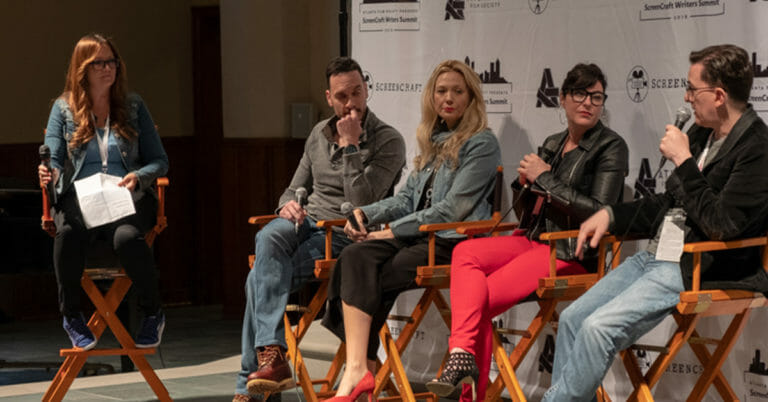By April Wright · April 19, 2018

This morning I had the honor of moderating the Writing Genre: Sci/Fi, Horror and Faith-Based panel at the ScreenCraft Writers Summit, ending the summit on a high note with panelists Eric Heisserer, writer of Lights Out and Arrival, Jason and Heather DeVan, whose film Tell Me Your Name is premiering at Atlanta Film Fest as the midnight movie on Saturday, April 21, and Alexandra Boylan, who has written and produced several indie genre and faith films.
There were many good takeaways from the panel. We discussed, what is genre and should you be writing it? Genre is broad these days: horror, thriller, sci-if, some comedy, action, faith films… an audience member asked, everything seems to be genre, what isn’t? Character-driven films are not genre. Lady Bird. Three Billboards Outside Ebbing, Missouri. Not genre. Some panelists said if it’s dependent on casting a big star, not genre. Built-in audience, you kind of know what of movie you’re getting, that’s genre.
Yes. Many writers have broken in writing genre screenplays. You need to stick to what’s expected of the genre but do something new or fresh with it – like Get Out, like A Quiet Place. The panelists agreed genre works best when it has something to say about society. There may be a theme that connects the concept/story and the character(s).
The panelists also agreed that the script will be better if you can put yourself into it personally, if you have something to say that you’re passionate about, or a way to infuse yourself and real life into the characters and situations, it shows.
They all did treatments first, laying out the story beats to make sure it’s all working before they write. Some used visuals – note cards, storyboards, mood boards. All use music when they write including film scores and movie trailer music.
Some on the panel start with characters, saying “It’s a story about a girl who…” Others start with the concept, “What if… this happens.” But Eric said now he blends it: “What if a girl… had this thing happen.” Most of the panelists watch and rewatch the films that have come before them in the genre to help find tone as well as mapping particular story beats and patterns. And of course to make sure your take is not something that’s been done before.
We also touched on genre films being conscious of budget, including scripts with a single location, although Eric thought that idea was perhaps a bit played out with audiences now. Genre is giving the audiences what they want and expect, but finding ways to do it differently and surprise them. One panelist made a point, things that may have been scary in the past, aren’t scary to a young audience these days. Or tropes that may have been funny in the past, young people just don’t understand because they’re in a different world now. So testing ideas with younger people in your target audience is a good idea.
We didn’t get into depth regarding genre in the television and episodic world, but the panelists all agreed it’s the same basic principles whether it’s for a feature script or a television pilot. And the good news, with films like Get Out and series like The Walking Dead there is a tremendous opportunity out there for people who are writing genre. Give them what they expect from the genre, but with a fresh take that gets across what you personally want to say.
 April Wright, guest blogger, 2018 ScreenCraft Writers Summit in Atlanta attendee.
April Wright, guest blogger, 2018 ScreenCraft Writers Summit in Atlanta attendee.